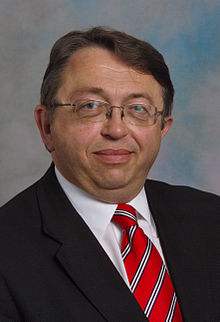Paul Clark (politician)
| Paul Clark | |
|---|---|
 |
|
| Parliamentary Under-Secretary of State for Transport | |
|
In office 5 October 2008 – 6 May 2010 |
|
| Prime Minister | Gordon Brown |
| Preceded by | Tom Harris |
| Succeeded by | Norman Baker |
| Parliamentary Private Secretary to the Deputy Prime Minister | |
|
In office 6 May 2005 – 27 June 2007 |
|
| Appointed by | John Prescott |
| Preceded by | David Watts |
| Succeeded by | Norman Lamb |
|
Member of Parliament for Gillingham |
|
|
In office 1 May 1997 – 12 April 2010 |
|
| Preceded by | James Couchman |
| Succeeded by | Constituency Abolished |
| Majority | 254 (0.6%) |
| Personal details | |
| Born |
29 April 1957 Gillingham, England |
| Political party | Labour |
| Spouse(s) | Julie Clark; 2 children |
| Residence | Gillingham, England |
| Alma mater | Keele University, University of Derby |
| a. ^ Office vacant from 27 June 2007 to 12 May 2010. | |
Paul Gordon Clark (born 29 April 1957) is a British Labour Party politician who was the Member of Parliament (MP) for Gillingham from 1997 to 2010. During his time in government Paul Clark served as Parliamentary Private Secretary to Derry Irvine, Charles Falconer, John Prescott, and Ed Balls, before being promoted in 2008 to the role of Parliamentary Under Secretary of State at the Department for Transport. In the 2010 election Clark was defeated by the Conservative candidate Rehman Chishti in the newly formed constituency of Gillingham and Rainham.
Clark was educated at Featherby Infants and Junior Schools and Gillingham Grammar School. He went on to gain a BA in economics and politics at Keele University in 1980. At university he became a sabbatical officer as Student Union Secretary. Later he studied for a diploma in management studies at the University of Derby in 1997. In 2011 Paul Clark was awarded an honorary doctorate by the University of Greenwich.
Paul Clark first became MP for Gillingham in the Labour landslide in the 1997 general election where he overturned a Conservative majority of 16,638. He had two further successful campaigns for Parliament in 2001 and 2005. Before becoming MP for Gillingham he had been on Gillingham Borough Council from 1982 until 1990 as a Labour councillor. From 1983 until 1989 he was deputy leader of the local party, and was elected leader in 1989. In 1990 he was elected by the Gillingham Labour Party to stand as the parliamentary candidate. His career prior to becoming an MP was with the AEEU and then the TUC.
...
Wikipedia
